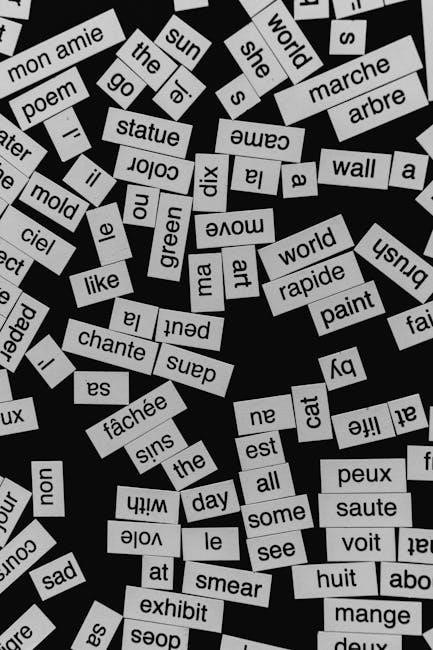The Iliad is an epic poem attributed to Homer, composed around the 8th century BC. It is a foundational work of European literature, available as a PDF through Project Gutenberg.
1.1. The Iliad as an Epic Poem
The Iliad is a cornerstone of ancient Greek literature, classified as an epic poem due to its grand scale and heroic themes. Composed in dactylic hexameter, it recounts the events of the Trojan War, focusing on Achilles’ wrath. The poem’s invocation of the Muse establishes its divine inspiration, while its structured narrative and elevated language define its epic nature. As a foundational text, the Iliad explores themes of honor, glory, and the human condition, cementing its legacy in world literature.
1.2. The Significance of the Invocation of the Muse
The invocation of the Muse at the beginning of the Iliad is a pivotal element, seeking divine inspiration and guidance. By calling upon the Muse, Homer establishes credibility and cultural continuity, aligning his work with ancient poetic traditions. This invocation also highlights the epic nature of the poem, emphasizing its divine and timeless themes. The Muse’s role ensures the accuracy and authority of the narrative, making it not just a human endeavor but a sacred transmission of history and values, essential for the epic’s enduring influence.
Historical Background and Composition
The Iliad, composed around the 8th century BC, is attributed to Homer, though its authorship remains debated. It captures the historical context of the Trojan War, blending legend with poetic artistry to reflect ancient Greek values and cultural identity.
2.1. The Dating of the Iliad and Its Attribution to Homer
The Iliad is traditionally dated to the 8th century BC, with its composition attributed to the ancient Greek poet Homer. However, debates persist about Homer’s existence and whether he was a single author or a collective name. The poem reflects the cultural and historical context of its time, blending legendary narratives with poetic artistry. Its attribution to Homer has endured for centuries, solidifying its place as a cornerstone of ancient Greek literature, now accessible in PDF formats for modern readers.
2.2. The Historical Context of the Trojan War
The Trojan War is central to the Iliad, set in the late Bronze Age. While its historicity is debated, the poem reflects ancient Greek values and societal norms. The war, sparked by the abduction of Helen, symbolizes honor, power, and conflict. Archaeological evidence suggests a possible historical basis, but the Iliad blends myth and legend. Its portrayal of heroes, kings, and divine intervention offers insights into the culture of the time. The PDF versions of the Iliad preserve this epic narrative for modern study and appreciation.
Major Themes in the Iliad
The Iliad explores themes of honor, glory, and the tragedy of war, delving into human suffering and the complexities of heroism. Divine intervention adds depth to mortal struggles.
3.1. The Theme of Honor and Glory
The pursuit of honor and glory drives the characters in the Iliad, as seen in Achilles’ quest for recognition and Hector’s defense of Troy. These themes are central to the epic’s exploration of heroism and mortality, reflecting the societal values of ancient Greece. Honor is not just personal but also communal, influencing decisions and conflicts throughout the poem, making it a timeless study of human ambition and pride. This theme remains a focal point in modern interpretations of the Iliad, available as a PDF for contemporary readers.
3.2. The Tragedy of War and Human Suffering
The Iliad profoundly explores the tragedy of war and its impact on humanity. The poem delves into the personal losses, moral dilemmas, and emotional toll faced by characters like Hector and Achilles. It portrays the devastating consequences of conflict, emphasizing the human cost beyond mere battles. This theme resonates deeply, offering a poignant reflection on the futility of war and the enduring suffering it inflicts. The PDF versions of the Iliad allow modern readers to engage with these timeless themes, preserving the poem’s emotional and philosophical depth for contemporary study and reflection.
Major Characters and Their Roles
The Iliad features a diverse cast of characters, each embodying distinct traits and motivations. Their interactions drive the narrative, exploring themes of heroism, pride, and conflict, available in PDF formats for modern readers to analyze their roles in depth.
4.1. Achilles: The Hero of the Iliad
Achilles, the central figure of the Iliad, embodies the ideals of ancient Greek heroism. His rage and grief over the seizure of his war prize, Briseis, by Agamemnon ignite the poem’s conflict. Achilles’ extraordinary strength and skill in battle make him nearly invincible, yet his human vulnerabilities, such as his deep love for Patroclus, highlight his tragic complexity. His eventual return to combat, driven by vengeance for Patroclus’ death, underscores his heroic yet flawed character, making him one of literature’s most enduring figures, now accessible in PDF formats for modern readers to explore his legend.
4.2. Hector: The Defender of Troy
Hector, a prince of Troy, emerges as a noble and compassionate warrior in the Iliad. Unlike Achilles, Hector fights to protect his city and family, embodying duty and honor. His duel with Achilles, ending in his tragic death, highlights the devastating cost of war. Hector’s humanity, as seen in his interactions with his loved ones, contrasts with the brutality of conflict. His story, accessible in PDF formats, remains a poignant reflection of heroism and sacrifice, resonating with readers across centuries.

Translations and Interpretations
Emily Wilson’s translation revitalizes Homer’s epic, offering fresh insights into the ancient tale, while highlighting the challenges of translating Greek poetry into modern language.
5.1. Emily Wilson’s Translation and Its Impact
Emily Wilson’s translation of the Iliad has been widely praised for its clarity and vitality, making Homer’s ancient epic accessible to modern readers. Her use of iambic pentameter captures the original’s rhythmic essence while maintaining readability. Wilson’s approach emphasizes the humanity of the characters, offering fresh perspectives on themes like war and honor. This translation has sparked renewed interest in classical literature, proving that ancient texts can resonate deeply in contemporary times. Its impact lies in bridging the gap between antiquity and today’s audience.
5.2. The Challenges of Translating Ancient Greek Poetry
Translating ancient Greek poetry like the Iliad presents significant challenges due to its complex syntax and cultural nuances. Maintaining the poetic meter, such as dactylic hexameter, while preserving the original meaning is particularly difficult. Additionally, the historical and mythological context must be accurately conveyed without losing the lyrical quality; Modern translators must balance fidelity to the source text with readability, ensuring that the essence of Homer’s work is accessible to contemporary readers. This delicate balance requires both linguistic expertise and a deep understanding of the poem’s artistic and cultural significance.

Structure and Style
The Iliad features a structured narrative with dactylic hexameter, enhancing its epic nature. Its style includes vivid imagery and similes, creating a dynamic and immersive storytelling experience.
6.1. The Use of Epic Simile in the Iliad
Homer’s use of epic similes in the Iliad enriches the narrative, drawing vivid comparisons between heroic actions and natural phenomena. These similes, often extending across multiple lines, create dynamic imagery, making the epic more engaging. For example, Achilles’ rage is likened to a raging fire, while armies are compared to swarms of insects. Such literary devices enhance the emotional depth and grandeur of the poem, allowing readers to connect deeply with the characters and their struggles. The PDF versions of the Iliad preserve these stylistic elements, ensuring their accessibility for modern readers.
6.2. The Role of Dactylic Hexameter
Dactylic hexameter, a rhythmic meter of six feet, is central to the Iliad’s poetic structure. Each foot consists of one stressed syllable followed by two unstressed, creating a musical quality. This meter enhances the epic’s grandeur and emotional resonance. In PDF versions, the formatting preserves this structure, allowing readers to experience the poem’s original rhythm. The use of dactylic hexameter ensures the Iliad remains a masterpiece of poetic form, blending beauty with narrative power, and its digital formats maintain this timeless appeal.

Influence on Literature and Art
The Iliad profoundly shaped European literature and art, inspiring countless works. Its themes and characters remain iconic, while its PDF availability ensures ongoing study and adaptation in modern media.
7.1. The Iliad’s Impact on European Literature
The Iliad has profoundly shaped European literature, serving as a foundational epic poem. Its themes of honor, glory, and the human cost of war resonate across generations. Poets and writers have drawn inspiration from its rich narrative and complex characters. The availability of the Iliad in PDF format has further expanded its reach, allowing modern readers to engage with its timeless storytelling. This accessibility ensures its influence continues to be felt in literature, art, and cultural discourse.
7.2. The Iliad in Modern Art and Media
The Iliad continues to inspire modern art and media, with its epic themes and characters adapted in films, stage productions, and visual art. Digital formats, including PDF, have made the poem accessible to new audiences, influencing contemporary creators. Its exploration of human emotion and conflict remains universally relevant, fostering fresh interpretations across various mediums, ensuring its enduring presence in global culture and artistic expression.

The Iliad as a PDF Resource
The Iliad is widely available as a PDF through platforms like Project Gutenberg and LitRes, offering readers convenient digital access to Homer’s timeless epic poem.
8.1. Availability of the Iliad in PDF Format
The Iliad is widely accessible in PDF format through various digital platforms. Project Gutenberg offers a free eBook version, while services like LitRes provide downloadable options. This ensures that Homer’s epic poem remains easily attainable for modern readers, facilitating both academic study and personal enjoyment. The digital availability has made the Iliad more accessible than ever, allowing readers to engage with its rich narrative and poetic beauty in a convenient and portable format, thus preserving its legacy for future generations.
8.2. The Benefits of Digital Access to the Iliad
Digital access to the Iliad in PDF format offers unparalleled convenience and accessibility. Readers can easily download and read Homer’s epic poem on various devices, enabling seamless engagement with its timeless narrative. Digital versions often include search functionalities, making it easier to explore specific themes or passages. This format also supports educational purposes, allowing scholars and students to annotate and reference the text efficiently. Moreover, digital access helps preserve the Iliad for future generations while reducing the need for physical storage, ensuring its enduring legacy in a modern, environmentally friendly manner.
Cultural and Philosophical Significance
The Iliad reflects ancient Greek values like honor and glory, while its exploration of human suffering and fate resonates deeply with philosophical inquiry, as seen in its PDF discussions.
9.1. The Iliad’s Reflection of Ancient Greek Values
The Iliad serves as a mirror to ancient Greek values, emphasizing honor, glory, and the warrior code. The poem highlights the importance of reputation and the pursuit of excellence, or arête, central to Greek culture. Themes of loyalty, duty, and the inevitability of fate resonate deeply, offering insights into the societal ideals of the time. These values are preserved in digital formats like PDF, ensuring their accessibility for modern readers to explore the ethical and cultural foundations of ancient Greece.
9.2. The Iliad and Its Relevance to Modern Philosophy
The Iliad remains a profound text for modern philosophical inquiry, exploring themes of human destiny, moral dilemmas, and the complexities of war. Its examination of honor, glory, and suffering resonates with contemporary debates on ethics and existentialism. The poem’s portrayal of human vulnerability and the inevitability of fate offers insights into the human condition, making it a valuable resource for philosophical reflection. Digital versions, such as the PDF format, ensure its accessibility for modern scholars and readers to engage with its timeless wisdom.
